 MyDogBreeds
MyDogBreedsBoth PekePoo and Aussie Poo are originated from United States. PekePoo may grow 34 cm / 13 inches shorter than Aussie Poo. PekePoo may weigh 21 kg / 46 pounds lesser than Aussie Poo. Both PekePoo and Aussie Poo has same life span. Both PekePoo and Aussie Poo has almost same litter size. Both PekePoo and Aussie Poo requires Moderate maintenance.
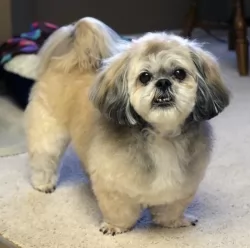 As a cross between a Peingese and a Poodle, your cute Peekapoo as he is also known, isn't a purebred dog. They first started making their appearance in the 1900s, in fact it was believed to be developed in the 1950s, being one of the oldest designer dog breeds.
As a cross between a Peingese and a Poodle, your cute Peekapoo as he is also known, isn't a purebred dog. They first started making their appearance in the 1900s, in fact it was believed to be developed in the 1950s, being one of the oldest designer dog breeds.
He was bred to be a a low-shedding, hypoallergenic companion dog. Both the parent dogs have their own unique, long histories. Dog experts aren’t too sure where the Pekepoo originated from.
This dog breed isn’t recognized by the American Kennel Club, because it is a hybrid breed, but it is recognized by the American Canine Hybrid Club.
Aussiepoo is a hybrid breed mix of purebred Poodle and Australian shepherd. If one of the parents is miniature Poodle, the Aussiepoo will be smaller than usual - mini Aussiepoo. We do not know precisely their origin, but we know that this beautiful mix is originating from USA, Australia and Canada.
Breeders can't really know how pups are going to look like until they are born. No one actually can control the combination of the genes. Usually, Aussiepoo is silky-fur playable and friendly dog, and that is always more than enough for Aussiepoo lovers.
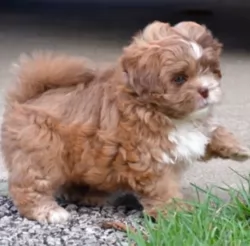 People love these little dogs because of their lack of shedding and it having a hypoallergenic coat. The coat is soft and can be wavy to curly with some feathering around the ears and tail.
People love these little dogs because of their lack of shedding and it having a hypoallergenic coat. The coat is soft and can be wavy to curly with some feathering around the ears and tail.
It is medium length and comes in a variety of colors such as fawn, cream, white, black, apricot or chocolate. The coat can have a mix of some of these colors too. This is a small dog that stands at between 23–26cm and weighs in the region of 4 to 9kg. He has floppy, low set ears and bright brown eyes.
They're such cute little dogs, loving and loyal to their human family. However, there is another side to them and they can be independent, aloof and stubborn. They’re very intelligent little dogs and will require both mental and physical stimulation to prevent boredom.
Because’s he’s so smart, you won’t have any trouble training him new skills. He’ll do well with children in the home as well as with pets, especially once he’s been trained and socialized.
He is able to settle into life in the city or the countryside. Even though he is a small dog, he will have to have his share of exercise if he is to remain healthy and content. They are dogs that love to be cuddled and petted ad he gets along well with everyone in the family.
Even though he is a true family pet, loving and loyal, he becomes a good watchdog too as he wants to protect all those he loves.
Every Aussiepoo depends on the size of the Poodle that was bred. If the parents are smaller than usual, the puppies will be smaller. Their colour also depends on the colour of the parents, and a litter can have puppies of a different colour. Their bodies are usually very muscled, with strong bones, but if you are not an outdoor type, there is a chance that your Aussiepoo will be obese. They are very active and they need a well-balanced diet.
These dogs are easy to train since they are intelligent and people oriented and you can train them while they are still puppies. Aussiepoo is generally friendly with strangers, always ready to play with children and they get along with other pets and animals. This breed is very affectionate and they like their humans to be close so it’s not recommendable to raise them to be loners.
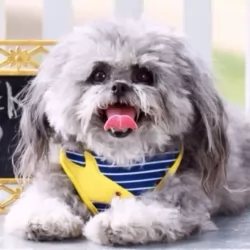 Your Pekepoo is such a gentle, sweet dog, making the perfect family pet. He is gentle, loving and amicable with his human family and wants to be involved in all their activities.
Your Pekepoo is such a gentle, sweet dog, making the perfect family pet. He is gentle, loving and amicable with his human family and wants to be involved in all their activities.
Coming from the Poodle and the Pekingese, he will have inherited some personality from each of these two popular dog breeds.
He is coming into your home ready to make you a splendid pet and companion and he asks nothing more than good care from you as a responsible dog owner.
Aussiepoo is a friendly kind. They are always ready to run and play with children, and they will tend to keep the children together (genes of the Australian shepherd). They are so playful that they will see no difference between an infant and a five-year-old, so be present if there are small children unstable to walk alone.
Except the fact that they love water and that they are great swimmers, they have many agility talents.
Since Aussiepoo is a loving, caring and sweet kind of dog, they will fit in anywhere you take them.
They are super friendly with strangers, and that can be an issue if you don’t keep an eye on them. But, they should never be left alone, or leash free outdoors. They are not so good as a guard dog, so if you tend to keep him inside with stay-at-home family member, this breed if no a good choice.
They generally learn quickly. Therefore, they are easy to train. They respond better to the prize training methods.
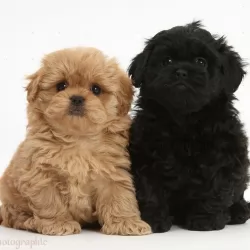 As with any dog, there are certain common dog ailments that you want to watch out for in your Pekepoo. Brachycephalic airway syndrome is one as well as dental disease and obesity.
As with any dog, there are certain common dog ailments that you want to watch out for in your Pekepoo. Brachycephalic airway syndrome is one as well as dental disease and obesity.
Because your Pekepoo has a somewhat squashed face, he may have abnormalities in the upper airways. Dogs with this syndrome have heavier breathing than other dogs and he might even have a cough. The troublesome part is that these breathing difficulties can put pressure on the cardiovascular system.
Small breed dogs are always at an increased risk of being obese and being obese can mean your dog possibly developing osteoarthritis, diabetes, cardiovascular disease, high blood pressure as well as other diseases.
Risk of: eye cataracts, hip dysplasia (malformation of the ball and socket joint), epilepsy, progressive retinal atrophy (degeneration of the retina cusing progressive vision loss culminating in blindness), sebaceous sdenitis (an inflammatory skin disease that affects the skin glands), bloat, nasal solar dermatitis (sun sensitivity).
Pelger - Huet syndrome (abnormalities in blood cells. PHA testing is advised with this dog breed. PHA is inherited and dangerous only if both parents carry this abnormality.)
Von Willebrand's Disease (inherited bleeding disorder caused by a deficiency in the amount of a specific protein needed for blood clotting. It can be detected by buccal mucosal screening.)
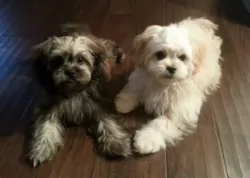 Your small designer Peekapoo will do well on a high quality kibble diet. Always check out the packaging and see how much to feed a small dog like this. It is better to give a dog 2 smaller meals a day as composed to one because with one they tend to gobble it up which can lead to a serious condition known as bloat.
Your small designer Peekapoo will do well on a high quality kibble diet. Always check out the packaging and see how much to feed a small dog like this. It is better to give a dog 2 smaller meals a day as composed to one because with one they tend to gobble it up which can lead to a serious condition known as bloat.
Dogs love simplicity and consistency with their food, but it is always to your dog’s benefit to feed him some home-made food too. Some chopped up boiled chicken, brown rice or pasta and some vegetables such as spinach, carrots and sweet potato added into the kibble occasionally will do him the world of good. Every now and again a little bit of raw meat can also be given.
Never leave your pet without a bowl of fresh, cool water.
Lively and energetic, your Peekapoo is going to need daily exercise. He will love the chance to sniff around and explore on your daily walks but he is ready to become more involved than that and will join you with hikes and swimming too. He is happiest when spending activity times with his human family. As with any dog, just make sure he doesn’t overdo it, especially on a hot day.
To keep your Pekepoo’s hair tangle-free, you’ll need to brush it twice a week. If you feel that his hair is getting too unruly, you can take him to the doggy parlor and have it trimmed into a shorter style. They’ll clip his nails at the same time, check inside his mouth for any signs of dental disease and check inside his ears too for dental infection.
It would be great to establish a feeding routine while the Aussiepoo is still a puppy. The best advice is to feed them three times a day, with the last meal around 5 p.m. After they finish their meal, leave them for a while. Make sure to feed your puppy with high-quality food rich in nutrients, and follow the recommendation of the dosage of the food. Avoid cheap dog food and addition meals.
Once you made a healthy feeding habit and your Aussiepoo is 6 months old, they won’t need three meals per a day. Leave the meal set for the morning and the one set for the evening. Avoiding night meals is a must. Don’t start any activity with the dog right after the meal. Make sure your dog has plenty of fresh water.
Activity, outdoor games, nutritional and balanced meals are the key for an Aussiepoo.
This breed is extremely intelligent. Since they are easy to train, you will be able to take them with you anywhere you go. They love to play in the water, but make sure they are not exposed to the sun for too long. They like smart games, mentally challenging, and they will be very playful with other dogs.